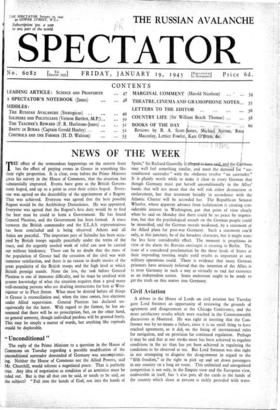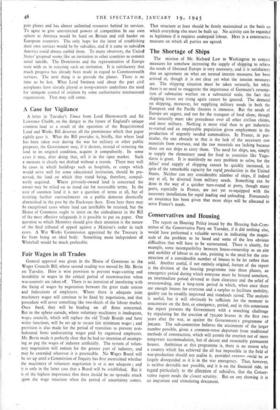Civil Aviation
A debate in the House of Lords on civil aviation last Tuesday gave Lord Swinton an opportunity of reviewing the grounds of agreement and disagreement at the Chicago Conference, and the more satisfactory results which were reached in the Commonwealth discussions at Montreal. He was right in insisting that the Con- ference was by no means a failure, since it is no small thing to have reached agreement, as it did, on the fixing of international rules for navigation, and on provision for continued regulation. Perhaps it may be said that at one stroke more has been achieved to regulate conditions in the air than has yet been achieved in regulating the conditions to be observed at sea. But Lord Swinton was also right in not attempting to disguise the disagreement in regard to the " fifth freedom," or the right to pick up and set down passengers in any country on a long air route. This unlimited and unregulated competition is not only, in the Empire view and the European view, undesirable in itself, but t also puts all the cards in the hands of the country which alone at present is richly provided with trans- port planes and has almost unlimited resources behind its services. To agree to give unrestricted powers of competition In our own sphere to America would be hard on Britain and still harder on European countries. The only hope for the latter of establishing their own services would be by subsidies, and if it came to subsidies America could always outbid them. To many observers, the United States' proposal seems like an invitation to other countries to commit aerial suicide. The Dominions and the representatives of Europe were with us in rejecting such an invitation. It is satisfactory that much progress has already been made in regard to Commonwealth services. The next thing is to provide the planes. There is no time to he lost. What Lord Swinton said about the part civil aeroplanes have already played as troop-carriers underlines the need for stringent control of aviation by some authoritative international organisation. That may still come.



























